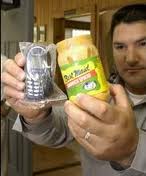 This article describes the dangers of not replacing smuggled cell phones in prison with a secure prison cell phone service that records all calls, controls the telephone numbers the cell phone can dial and blocks access to the internet.
This article describes the dangers of not replacing smuggled cell phones in prison with a secure prison cell phone service that records all calls, controls the telephone numbers the cell phone can dial and blocks access to the internet.
In most states, if you smuggle a cell phone into a prison, you could end up serving time behind bars yourself. But California has no law to keep contraband cell phones from inmates. A fact that Robert Johnson is very familiar with.
Johnson used to be a prison guard captain in South Carolina. Last year, he was getting ready for work when someone kicked in the front door of his house.
“All of a sudden I hear this ‘boom,'” said Johnson. “I heard somebody yell ‘Police!’ So I come out the bathroom. We meet in the hallway.”
Johnson came face-to-face with a man holding a gun.
“We tussled and somehow I guess he broke away and he raised his .38 and he shot me point blank range in the stomach and chest six times,” said Johnson.
That pistol wasn’t the only weapon aimed at Johnson. The other was the cell phone an inmate used to order the “hit.” Johnson says an inmate had been selling cell phones to other inmates for 800 dollars a pop. Johnson had cracked down on his operation.
“Through a cell phone, he found exactly where I lived at,” said Johnson. “He found the city. He even found my phone number — all through the Internet with his cell phone.”
The suspects face federal charges. Johnson, now 58, spent three months in the hospital. His days as a prison guard are over. Johnson recounted his story at a recent conference hosted by the California Department of Corrections and Rehabilitation. The Department’s Richard Subia says inmates use cell phones to order hits, run drug rings, and threaten victims, witnesses and judges.
“We’ve found cell phones in walls, put down inside of walls, inside of toilets, in peanut butter, in garlic,” said Subia.
According to Subia, prison staff confiscated 11,000 cell phones from inmates last year. Prison visitors, young and old, smuggled them in. So did prison workers.
“We had an officer that we stopped in one of our northern California prisons who said he made $100,000 in one year for bringing in cell phones,” said Rubia. “One hundred thousand dollars!”
The Department of Corrections fires staff that smuggle unlocked cell phones. But the Attorney General can’t prosecute them or the inmates who use the phones unless a phone was used to commit a crime. State Senator Alex Padilla says that is “not good enough.”
“There are no consequences for the inmates who are caught with cell phones and there is no consequence for either a visitor or an employee who is caught smuggling cell phones in, and that is unacceptable,” said Padilla.
The San Fernando Valley Democrat authored a bill to make it a misdemeanor to smuggle cell phones into prison. Anyone convicted would get six months in jail and up to a $5,000 fine per phone. Padilla’s bill would also extend the sentences of inmates found with contraband phones. But doing that is costly, which is why the Senate Appropriations Committee shelved the measure.
The Department of Finance estimates longer sentences cost up to $50,000 more per year, per inmate. But Senator Padilla argues the state will save money by preventing crimes carried out with wholesale cell phones.
“We don’t suspect, we know that they are being used by inmates to commit and coordinate crimes both inside and outside of prisons,” said Padilla.
The Senate Appropriations Committee put Padilla’s bill “on suspense,” which is a kind of legislative backwater for more costly bills. The committee will reconsider those bills on a single day in May. Most bills on suspense die in committee.
- Blockchain System for Compliant Inmate Transactions - March 4, 2025
- Securus Gets the Signal, Eleven Years Later - August 23, 2024
- Multi-Blockchain System for Inmate Forensics - April 2, 2024




